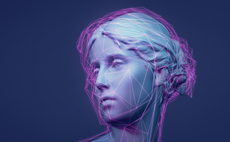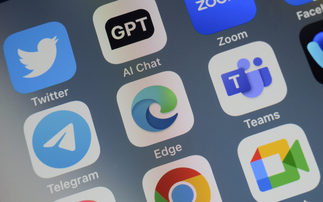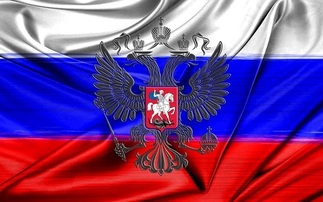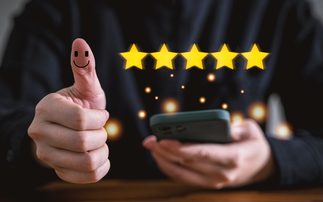The Decentralized Web Summit is over - what's next?
30/07/2018 Blockstack on identitly and decoupling data
Authentication and identity are cornerstones of decentralised networking. Through cryptography, I as a user can verify who I am and what data I own without reference to any central registry. I can use my decentralised ID (DID) to log on securely and perhaps anonymously to services and applications with no third party involved.
Identity is bound up with another tenet of decentralisation: separating the data from the applications. Applications are now interfaces to shared data rather than controllers and manipulators of it. Without my express permission, apps can no longer use and retain data beyond my control.
Coupling data to ID rather than apps was the starting point for the Blockstack platform, as head of growth Patrick Stanley explained.
"Blockstack is creating a digital ecosystem of applications that let users fully own their identities and data on the Internet. User data - like photos and messages - are completely decoupled from the applications. Apps can no longer lock users and their social graph in, since they no longer store anything."
Storage is taken care of elsewhere, in a decentralised storage system called Gaia. As apps are now 'views' or interfaces you don't need to log in to each individually.
"People use applications on Blockstack just like they would with today's Internet. But instead of signing up for each app one-by-one with an email address and password — or a Google/Facebook log-in — users have an identity that's registered in the blockchain and a public key that permissions applications or other users to access pieces of data."
That's lots of positives so far from a user point of view, and also for developers who have a simpler architecture and fewer security vulnerabilities to worry about, but of course, there's a catch. It's the difference between shooting from the hip and running everything by a committee.
"Decentralisation increases coordination costs. High coordination costs make it hard to get some kinds of things done, but with the upside that the things that do get done are done with the consensus of all stakeholders."
There are already privacy-centric social networks and messaging apps available on Blockstack, but asked about what remains on the to-do list, Stanley mentioned "the development of a killer app". Simply replicating what's gone before with a few tweaks won't be enough.
A viable business model that doesn't depend on tracking-based advertising is another crucial requirement - what would Facebook be without the data it controls? - as is interoperability with other systems, he said.
And the big picture? Why is Blockstack sponsoring the event? Ultimately it's about securing digital freedom, said Stanley.
"If we're going to live free lives online, there needs to be protocol-level safeguards to ensure your data stays under your control. Otherwise, the people who control your data ultimately control your digital life."
Independent but interconnected
27/06/2018 OmiseGO on the importance of UI
OmiseGO, a sponsor of the Decentralized Web Summit, is a subsidiary of Asia-Pacific regional fintech firm Omise. Omise is a payments gateway similar to PayPal or Stripe that's doing brisk business in East Asia. Omise enables online and mobile fiat currency transactions between customers and participating vendors, and OmiseGO, a separate company and open source project, aims to do the same with cryptocurrencies too.
The backbone of OmiseGO is the OMG blockchain which in turn is built on Ethereum. The goal is to provide seamless interoperability across all blockchains and providers. OMG uses Plasma, an enhancement designed to speed up transactions on the Ethereum blockchain, and the company counts Ethereum's founders Vitalik Buterin and Gavin Wood among its advisors. While it's very early days, in the long run OmiseGO wants to extend banking-type services to the billions of 'unbanked' people by cutting out the financial middleman who don't serve those people, and also giving the 'banked' an alternative.
The current Internet has too many middlemen of its own, meaning that equal access does not mean equal control, explained OmiseGO's head of ecosystem growth Althea Allen in an email.
"The decentralised web is crucial is providing equitable agency within the systems that internet users are accessing. Sovereignty over your own data, money and communication; access to information that is not censored or manipulated; the ability to control what aspects of your identity are shared and with whom; these are essential freedoms that the centralised web simply will not provide."
However, if the alternatives are awkward and clunky, they will never take off.
"It is difficult, though not impossible, to create a decentralised system that provides the kind of user experience that the average internet user has come to expect. Mass adoption is unlikely until we can provide decentralised platforms that are powerful, intuitive and require little or no change in users' habits."
Team OmiseGO
Blockchains are a powerful tool for decentralisation as they can help keep control of events and processes across the network, but that depends on how they are used. There's a lot of ‘blockchain-washing' out there, Allen warned.
"Blockchains are not intrinsically decentralised - they can absolutely be private and proprietary. Many institutions, old and new, are showing an interest in adopting new technologies such as blockchains, maintaining the same centres of power and influence, and putting an ‘I blockchained' sticker on them - essentially, appropriating the rhetoric of decentralisation without actually adopting the principles."
Asked about the plethora of competing decentralised approaches, Allen said she believes this is positive, but sharing ideas is vital too.
"Cooperation is crucial for us to move the space forward, while healthy competition encourages the exploration of many different possible solutions to the same problems. We work particularly closely with Ethereum, but the success of our project depends on a thriving ecosystem (which extends well beyond crypto or even blockchain technology). To this end, we make a concerted effort to work with projects and individuals in many fields who are contributing to building the decentralised web."
26/07/2018 MaidSafe on collaboration
As we mentioned in the introduction, a decentralised web will require a number of different interlocking components, including decentralised storage, decentralised networking, decentralised applications and decentralised identities.
MaidSafe, one of the event's sponsors, is trying to cover all but one these bases with its autonomous SAFE Network, replacing the Transport, Session and Presentation layers of the current seven-layer internet with decentralised alternatives to create a platform for applications. The project is currently at alpha test stage.
So it's all sewn up then, no need for further collaboration? Not at all said CEO David Irvine, who will be speaking at the event, pointing to the firm's open-sourcing of its PARSEC consensus algorithm and its invitation to other projects to help develop it. It's just not always easy to organise joint ventures he said. The summit will bring together many pioneers and innovators (70-plus projects are represented) with each pushing their own ideas for redefining the web.
"[Everyone's] so passionate about improving the internet experience, we are defining the rules for the future, and everyone has a point of view. That does mean there are some egos out there who are quite vocal about the merits of their approach versus others, which makes for good media stories and fuels hype, but it's not what we're really focused on."
Within any movement dedicated to upending the status quo, there lurks the danger of a People's Front of Judea-type scenario with infighting destroying the possibilities of cooperation. Amplifying the risk, many projects in this space are funded through cryptocurrency tokens, which adds profiteering to the mix. It's easy to see how the whole thing could implode, but Irvine says he's now starting to see real collaborations happen and hopes the summit will bring more opportunities.
"We've already been talking to Sir Tim Berners-Lee's Solid project at MIT, and we have a growing number of developers experimenting with applications for the platform," he said.
MaidSafe's David Irvine
MaidSafe has been a fixture in the decentralised firmament for a while, predating even the blockchain which is the backbone of many other ventures. At one time it had the space almost to itself but has since been joined by a host of others. Asked about his company's USP, Irvine came back with one word: "honesty".
We asked him to expand.
"There is far too much hype in the wider blockchain crypto space and we have always tried to distance ourselves from that nonsense. We're trying to build something hugely complex and radically different. That doesn't happen overnight, so you have to be upfront with people so they are not misled. Sure we've learned along the way, got some things wrong, but whenever we have we've held our hands up and that has helped us."
And the big-picture goal?
"In essence, privacy, security and freedom. The technology we are building will provide private and secure communications, as well as freedom through the unfettered access to all humanity's data."
25/07/2018 Kahle and Berners-Lee on the need for decentralisation
Organiser the Internet Archive directed us to some recent statements by founder Brewster Kahle. Here Kahle outlines some of the problems with the existing web.
"Some of the problems the World Wide Web that we've seen in the last few years are the surveillance structures that Snowden gave light to. There are the trolling problems that we saw in the last election. There's privacy aspects, of people spilling their privacy into companies that sometimes aren't the most trustworthy. There's advertising technologies being used against users. There's a lot of failings that we've seen in the World Wide Web."
To be successful, the decentralised web will need to encourage "lots of winners, lots of participation, lots of voices" he said.
"So this is a time to join in, to find a place, get knee-deep in the technologies. Try some things out. Break some stuff. Invest some time and effort. Let's build a better, open world, one that serves more of us."
Open source principles are essential but not sufficient. There must be a focus on performance, functionality and new ideas.
"We're only going to survive if the open world is more interesting than closed app worlds ... what I would think of as a dystopian world of closed, segmented, siloed, corporately-owned little pieces of property. I'd much rather see an open, next-generation web succeed," Kahle said.
As 'Father of the Web' (Mk I), Tim Berners-Lee has become increasingly disillusioned with his offspring. Around the time of the previous Decentralized Web Summit in 2016, he said: "The web has got so big that if a company can control your access to the internet, if they can control which websites you go to, they have tremendous control over your life.
"If they can spy on what you're doing they can understand a huge amount about you, and similarly if a government can block you going to, for example, the opposition's political pages, they can give you a blinkered view of reality to keep themselves in power."
Since then, of course, many of the things he warned about have become evident in increasingly obvious and frightening ways. And in the US Congress recently scrapped net neutrality, doing away - in that country at least - with a longstanding principle of the internet, namely that ISPs should treat all data equally.
So, are there any positive developments to report over the last two years? Berners-Lee remains hopeful.
"There's massive public awareness of the effects of social networks and the unintended consequences," he told Computing. "There's a huge backlash from people wanting to control their own data."
In part this awareness is being driven by GDPR coming into effect, in part by news headlines.
Meanwhile, there's the rise of "companies which respect user privacy and do not do anything at all with user data" (he namechecks social network MeWe to which he acts as an advisor), open-source collaborations like the data portability project (DTP) led by tech giants, and his own project Solid which is "turning from an experiment into a platform and the start of a movement".
"These are exciting times," said Berners-Lee.






















